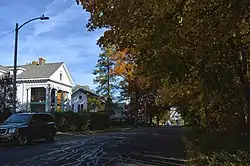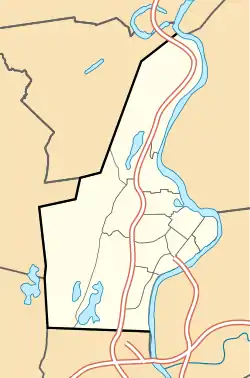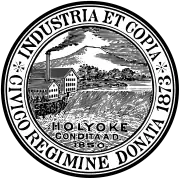Highland Park, Holyoke, Massachusetts
Highland Park is a neighborhood in Holyoke, Massachusetts located to the northwest of the city center, approximately 1 mile (1.6 km) from downtown, on the banks of the Connecticut River. The neighborhood features Jones Park, originally itself known as Highland Park, which was designed by the influential Olmsted Brothers firm. The residential neighborhood was initially developed as a streetcar suburb by the Highland Park Improvement Association, which underwent several iterations between 1893 and 1930. Today the neighborhood contains numerous Victorian and early 20th century housing and about 219 acres (89 ha) of residential zoning, as well as the Edward Nelson White School.
Highland Park | |
|---|---|
 Houses adjacent to the Highland Dingle, including that of a prominent developer of the neighborhood, Samuel O. Hoyt (left-foreground)[2] | |
 Highland Park  Highland Park  Highland Park | |
| Coordinates: 42°13′20″N 72°37′13″W | |
| Country | United States |
| State | Massachusetts |
| City | Holyoke |
| Wards | 7 |
| Precincts | 7A, 7B |
| Established | February 1893 |
| Area | |
| • Total | 0.85 sq mi (2.2 km2) |
| Elevation | 230 ft (70 m) |
| ZIP code | 01040 |
| Area code(s) | 413 |
| GNIS feature ID | 609018[4] |
| MACRIS ID | HLY.F |
History
Early development plans
The first Highland Park Improvement Association, comprising Watson Whittlesey, W. H. Brooks, E. H. Cummings, and Ashley B. Tower gave the area its name and devised the first street plans and building lots around February 1893 as an upscale housing development.[5] Within a year of their first meetings, ultimately their plans, including a bridge across the river decades before the Muller Bridge, would fall apart, and Whittlesey would see litigation taken against him by his associates.[6]
The Highland Park Improvement Association dissolved shortly after the splitting of its associates, and in 1896 the land was deeded to the firm Whitcomb & Pearsons, who laid out the initial plots and tentative roads, keeping with the idea that the suburb was one for mill management and an upper-middle class.[7][8] In 1909, Whitcomb would leave the project and the firm Plimpton, Pearsons, and Richards would assume the development role.[8] That same year, Samuel Osborne Hoyt arrived in the city. A developer himself, he would work under the new firm until in 1914 he bought out the shares of his associates and made it his own contracting firm. Although the neighborhood began with a more turbulent history, within ten years Hoyt would become known as the "father of Highland Park" in the way that other streetcar suburbs like Oakdale and Springdale had their own respective developer-founder figures.[9][10][11]
Community club and culture
%252C_Holyoke%252C_Massachusetts%252C_planting_plan_1909.jpg.webp)
%252C_Holyoke%252C_Massachusetts.jpg.webp)
Highland Park would largely be shaped after 1909, as in that same year the city would purchase Smith's Ferry to the north, from Northampton,[13] and the Olmsted Brothers were commissioned to design Jones Point Park, previously identified on maps as Highland Park or "Monte Vista".[14][15] In 1909, Pleasant Street was opened as a public thoroughfare north of the dingle, as the "Ivy League" streets were gradually built out with more residences.[16][lower-alpha 1] In 1910, the remaining undeveloped tracts to the north would host a grand exhibition for the aviation stunts of Charles F. Willard. In the history of aviation, Willard was the first barnstormer, first person to fly 3 passengers in the United States, and first person to be shot out of the sky by a bullet— that of an annoyed farmer. Willard's feats would attract a crowd of more than 7,000 for the YMCA benefit exhibition, and thousands more would view his escapades from South Hadley and boats on the Connecticut River. It was reported that 24 streetcars were dedicated to moving out the crowd at the show's conclusion.[17] By 1911, the Holyoke Street Railway was being extended through the neighborhood along Pleasant street toward Northampton Street and Mountain Park.[18] Although not well documented, at some point leading up to 1911, the neighborhood was also considered as a railway stop for the Boston and Maine Railroad, whose former tracks run between its homes and the Connecticut River.[14]
In 1913 the new neighborhood's residents began to organize, hosting banquets and plays, forming the Highland Park Club.[19] Seeking a clubhouse and amphitheater, Hoyt and his associates would donate a plot of land at 250 Pleasant Street to the club for these purposes, and before 1919 a club house in the Tudor Revival style was constructed on that spot.[20][21]
Up through the mid 1920s the community house would serve as a social space for neighborhood dances, mayoral political campaigns, and even received Second Lady Grace Coolidge for a reception after her husband had become Warren G. Harding's Vice-President.[22][23][24]
In 1923, the community house began functioning as a private school, known as the Lovering School, and was partially reconstructed after a fire that same year.[25] It would continue to be used in this capacity until its last class graduated in 1939, and was converted to a private residence thereafter.[26]
Notes
- The street scheme, from north to south, includes, the names Vassar, Radcliffe, Princeton, Stanford, Amherst, Harvard, Wellesley, Dartmouth, Harvard, Yale.
References
| Wikimedia Commons has media related to Highland Park, Holyoke, Massachusetts. |
- HLY.1233, Massachusetts Cultural Resource Information System (MACRIS).
- HLY.1233, Massachusetts Cultural Resource Information System (MACRIS).
- Spatial analysis of "Holyoke Neighborhoods" (PDF). Archived from the original (PDF) on 2 August 2017. Retrieved 3 Jun 2016.
- "Highland Park, Holyoke, Massachusetts". Geographic Names Information System. United States Geological Survey. Retrieved 8 December 2019.
- "Holyoke". Springfield Republican. Springfield, Mass. February 21, 1893. p. 6.
The Highland park improvement association will have a hearing at the state-house this week on a petition for articles of incorporation. The capital stock of the company will be $15,000.
- "Holyoke; A Land Boom Falls Flat". Springfield Republican. Springfield, Mass. September 27, 1893. p. 6.
- "How Holyoke Has Spread Out; Absorption of the Suburbs; Many Outlying Districts That Were Developed and are Now Considered "In the City"". Springfield Republican. Springfield, Mass. July 8, 1906. p. 14.
This property passed into the hands of Whitcomb & Pearsons, who have laid plans to make a territory nearly ideal in all that a fine suburb should be.
- "Holyoke; New Realty Trust Formed; G. A. Plimpton, G. T. Pearsons, and E. G. Richards to Develop Highland Park Section". Springfield Republican. Springfield, Mass. May 28, 1909. p. 12.
- "Holyoke Deaths; Samuel O. Hoyt, Contractor, Dead". Springfield Union. Springfield, Mass. November 2, 1954. p. 45.
Mr. Hoyt came to this city in 1909 and immediately began the development of the Highland Park section while he was associated with the Plinton & Richards firm, becoming a partner in the business when it was renamed the Highland Park Building Company in 1912, and purchasing the remaining shares by 1914. He was the constructor of the Holyoke Masonic Temple, and also...several schools, hospitals and libraries in the western part of the state. Prominent in the Masonic order, he was a past master of Mount Nonotuck Lodge...
- "Holyoke". Springfield Republican. Springfield, Mass. November 15, 1919. p. 9.
Another section has been struck by the building boom in Holyoke, Samuel O. Hoyt, 'father' of Highland park, to-day filed plans with the city engineer for five new residences in that section of Holyoke. Two are to be built on contract and the other three for rent.
- "Holyoke". Springfield Republican. Springfield, MA. August 3, 1912. p. 14.
George A. Plimpton and Ellis G. Richards, both of New York city, and Samuel O. Hoyt of Holyoke have filed a declaration of trust making themselves trustees of a company to be known as the Highland Park building company. The intention of the trust is to develop Highland park in Holyoke.
- "[Holyoke Anniversary Edition]". Springfield Republican. Springfield, Mass. September 2, 1923. p. 63.
The Highland park community house...
- DiCarlo, Ella Merkel (1982). Holyoke–Chicopee, a Perspective; 1882-1982. Transcript-Telegram Co. pp. 238–239. OCLC 9299261.
- Richards, Harold H (1911). Richards Standard Atlas of the City of Holyoke, Massachusetts. Springfield, Mass.: Richards Map Company.
- Map of the City of Holyoke, Mass. Holyoke, Mass.: James L. Tighe, C. E. 1903.
- "Meeting of the Aldermen; Petition on Old County Road Question Received". Springfield Republican. Springfield, Mass. November 4, 1909. p. 10.
The Highland park association petitioned for the making of Pleasant street a public street from the dingle to the point north of Princeton street.
- "3 Passengers in Aeroplane; Charles F. Willard Establishes Record For America". The Sun. Baltimore, Md. August 15, 1910. p. 1.
New York. Aug. 14 —Charles F. Willard in a Curtiss aeroplane, flew with three passengers and himself for 500 yards at Mineola, L. I. this evening. This is the first three passenger flight recorded in America. With his brother, W. H. Willard, R. F. Patterson and Archibald Albin aboard he ascended prettily and skimmed the distance at a height of 20 feet.
- "Charles F. Willard, Who is Trying to Perfect the Monoplane; Bullet Hit Airship of Boston Aviator; Charles F. Willard of Hull Has Become Prominent in Aeronautics". Boston Journal. Boston, Mass. June 2, 1910. p. 3.
It was a Boston man who figured in the first case recorded of an aeroplane brought to earth by a bullet...Charles F. Willard, whose machine was wrecked in Joplin, Mo., during a cross-country flight
- AP News (February 2, 1977). "Charles F. Willard Is Dead". The New York Times. New York. p. 17.
- Willard, Charles F. (February 1956). Frank H. Ellis (ed.). Frail were my Wings. Flying Magazine. pp. 31, 70.
- "[Advertisement] Curtiss Aviation Meet; Highland Park, Holyoke; Charles F. Willard, Aviator; Saturday, September 17, 3:30 PM". Springfield Republican. Springfield, Mass. September 15, 1910. p. 1.
- "Holyoke Aviation Meet; Willard Makes Two Flights; Crowd of 7000 in Attendance; Many Others Get a Free View—Event Successful in Every Way". Springfield Republican. Springfield, Mass. September 18, 1910. p. 12.
- "Charles F. Willard, Who is Trying to Perfect the Monoplane; Bullet Hit Airship of Boston Aviator; Charles F. Willard of Hull Has Become Prominent in Aeronautics". Boston Journal. Boston, Mass. June 2, 1910. p. 3.
- "Holyoke Aldermen Meet". Springfield Republican. Springfield, Mass. April 5, 1911. p. 11.
S. A. Hoyt of the Highland park association asked that a committee of three be appointed from the board to confer with C. C. Hastings and the street railway relative to the extension of North Pleasant street...
- "For Highland Park Clubhouse". Springfield Union. Springfield, Mass. July 15, 1913. p. 13.
As a result of the meeting tonight of the Highland Park club, the Highland Park association will be asked to donate a piece of land in Highland park at the foot of Cleveland street to be used by the club
- HLY.1233, Massachusetts Cultural Resource Information System (MACRIS).
- "Clubhouse for Highland Park; to Overlook Grounds on Which Pageant Was Presented July 4; Plan for Dramatics; Proposal to Give Series of Shaksperean [sic] Plays Outdoors". Springfield Union. Springfield, Mass. July 8, 1913. p. 12.
It has been decided to build the proposed Highland Park clubhouse in North Pleasant street on the eminence overlooking the splendid amphitheater like grounds which the Fourth of July pageant was presented by the residents of Highland park last Friday afternoon. In connection with the clubhouse the Highland park associates will give the grounds directly in front of the building and adjacent to the Jones point public park to the new club...the Highland Park club was formed a few months ago and is already one of the social institutions of the city.
- "Holyoke Social News; Many Events During Thanksgiving Season — Personal Mention". Springfield Republican. Springfield, Mass. December 2, 1923. p. 3.
The Highland Park club gave their first dance of the season Tuesday night at the Highland Park community house.
- "Mayor Cronin Speaks at Community House; Holyoke Candidate For Re-election Defends His Administration". Springfield Republican. Springfield, Mass. December 4, 1921. p. 15.
Mayor Cronin spoke at 7.45 tonight to about 100 residents of the Highland park district at the Highland Park community park.
- "Mrs Coolidge A Guest at Holyoke; Attends Wheaton College Card Party at Highland Park Community House". Springfield Republican. Springfield, Mass. May 8, 1921. p. 2.
Mrs Calvin Coolidge, wife of Vice-President Coolidge was the guest of honor at the Wheaton college card party this afternoon at the Highland Park Community house. It was Mrs. Coolidge's first appearance in this city since her husband was inaugurated into his present office.
- "Fire in Private School; Former Highland Park Community House Badly Damaged". Springfield Republican. Springfield, Mass. April 10, 1923. p. 3.
The former Highland park community house, recently used as the home of the Lovering private school, on upper Pleasant street, was considerably damaged by fire about 2:45 this morning
- "Lovering School Holds Graduation". Springfield Republican. Springfield, Mass. June 7, 1939. p. 10.
The last class graduation following a school history over the past 35 years, took place this morning in the Lovering school on North Pleasant street. The school will be discontinued this year.
